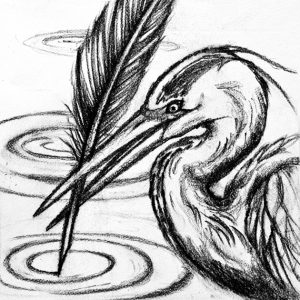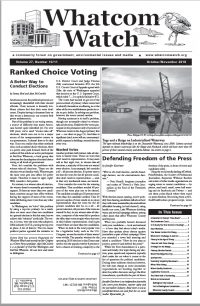Boris Schleinkofer, poetrywatch editor
“When power leads man toward arrogance, poetry reminds him of his limitations. When power narrows the area of man’s concern, poetry reminds him of the richness and diversity of existence. When power corrupts, poetry cleanses.” — John F. Kennedy
Poetry has a voice in our community, and the Whatcom Watch is adding to its chorus. You all love poetry, right? Well, here you go!
Subject matter is unlimited, but poetry featuring or specific to Whatcom County and issues addressed by Whatcom Watch (government, the environment and media) will likely get first preference.
Please keep it to around 25 lines; otherwise, we might have to edit your work to fit. Don’t make yourself unprintable.
Send poems and your short, two- or three-sentence bios as a word document attachment to poetry@whatcomwatch.org.
The deadline is the first day of the month.
Please understand that acceptance and final appearance of pieces are subject to space constraints and editorial requirements. By submitting, authors give Whatcom Watch permission for one-time publication rights in the paper and electronic editions.
Gloss
by Vincent Sementelli writing as Fjord Bjornson
Orphaned metal ready to be mined
To find a new home in some amulet or slave
Or trace, but for a prison of stone
Bound and beaten
Vault of ore it was forged in
But to gloss over how it got there
How it was formed in the furnace of a star
How it sailed black water
And survived to a virgin shore
That cooled in cosmic whirling
Wandering orbs
Deforming and drop forged
Foaming at their ocean’d lips
Spitting froth and bubbling foam
An infant in protean womb
______________________________
Vincent Sementelli writes as a scientific journalist for the National Park Service, publishing within the Sonoran Desert Network. Selected poems as S.L.V. Stronwin published at The Writing Disorder, and self-published poetry and prose is available under far too many pseudonyms at amazon.com/author/slvs.
Untitled
by Betsy Behnke
We could always die unregarded.
Why does that matter to us?
We let the creatures go,
though not always unregarded;
why are we less upset by extinctions
than by the wall beyond which
our personal memories may shatter
into irredeemable fragments?
The answer used to be clear:
the world has its rhythms, keeps going,
creatures and their allies have
their mutual indebtedness, and
we could trust in that. But now
they can no longer guard us from our frailty —
and how can we die without witnessing what we’re losing,
and clawing it back to start healing the deep hole
in the self we thought we were
back when we imagined ourselves separate?
o Gaia, let my death replace me
with another, fresher advocate, with a tradition
that stands its ground unsilenced and sworn to sing out
those irreplaceable anthems confirming
that we are all sustained by the same sun …
________________________________
Betsy Behnke (a Husserlian phenomenologist living in Ferndale) owes the notion of life (Tzutujil káslimaal) as “mutual indebtedness” to Martín Prechtel, “The Unlikely Peace at Cuchumaquic” (Berkeley: North Atlantic Books, 2012), 107.





























